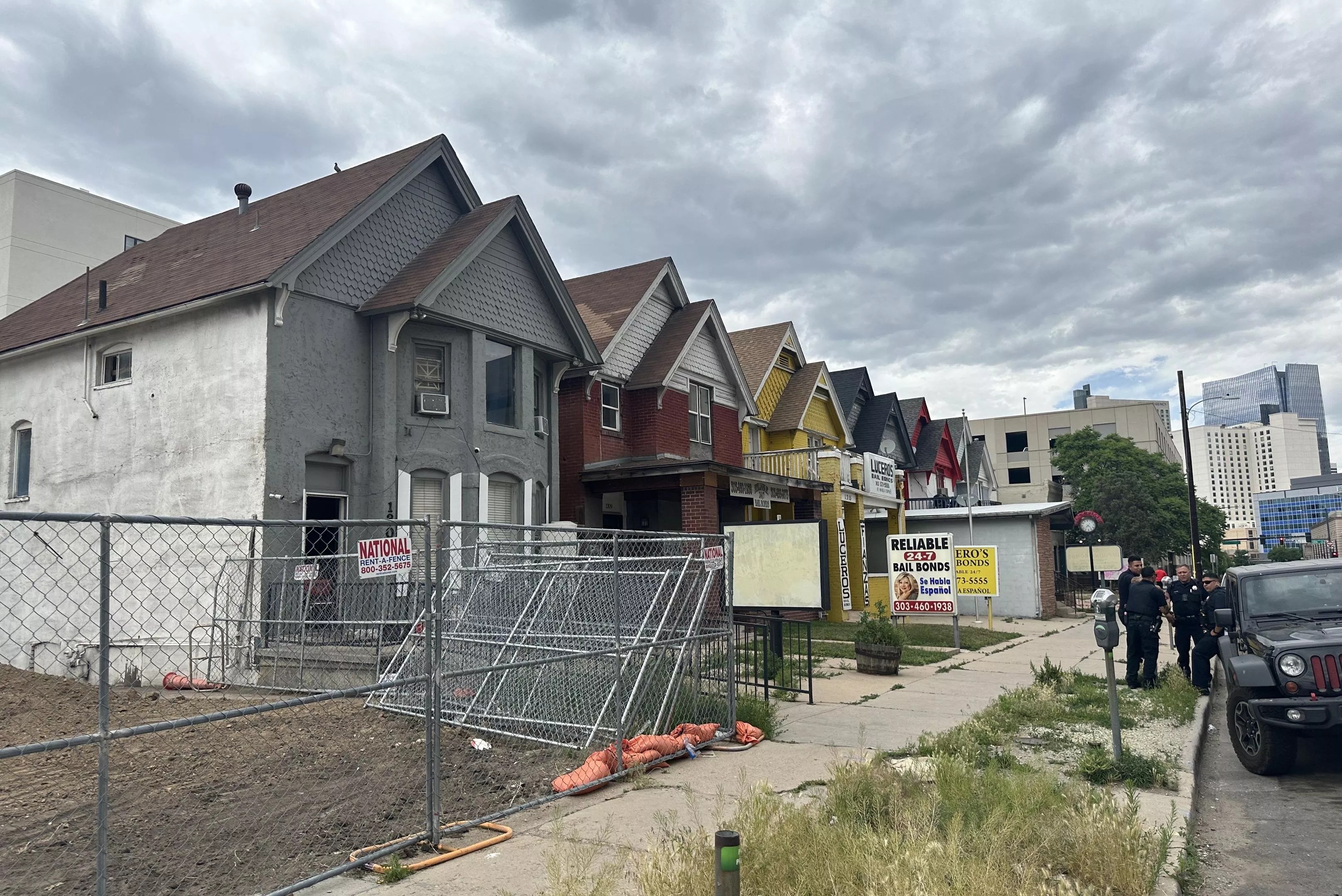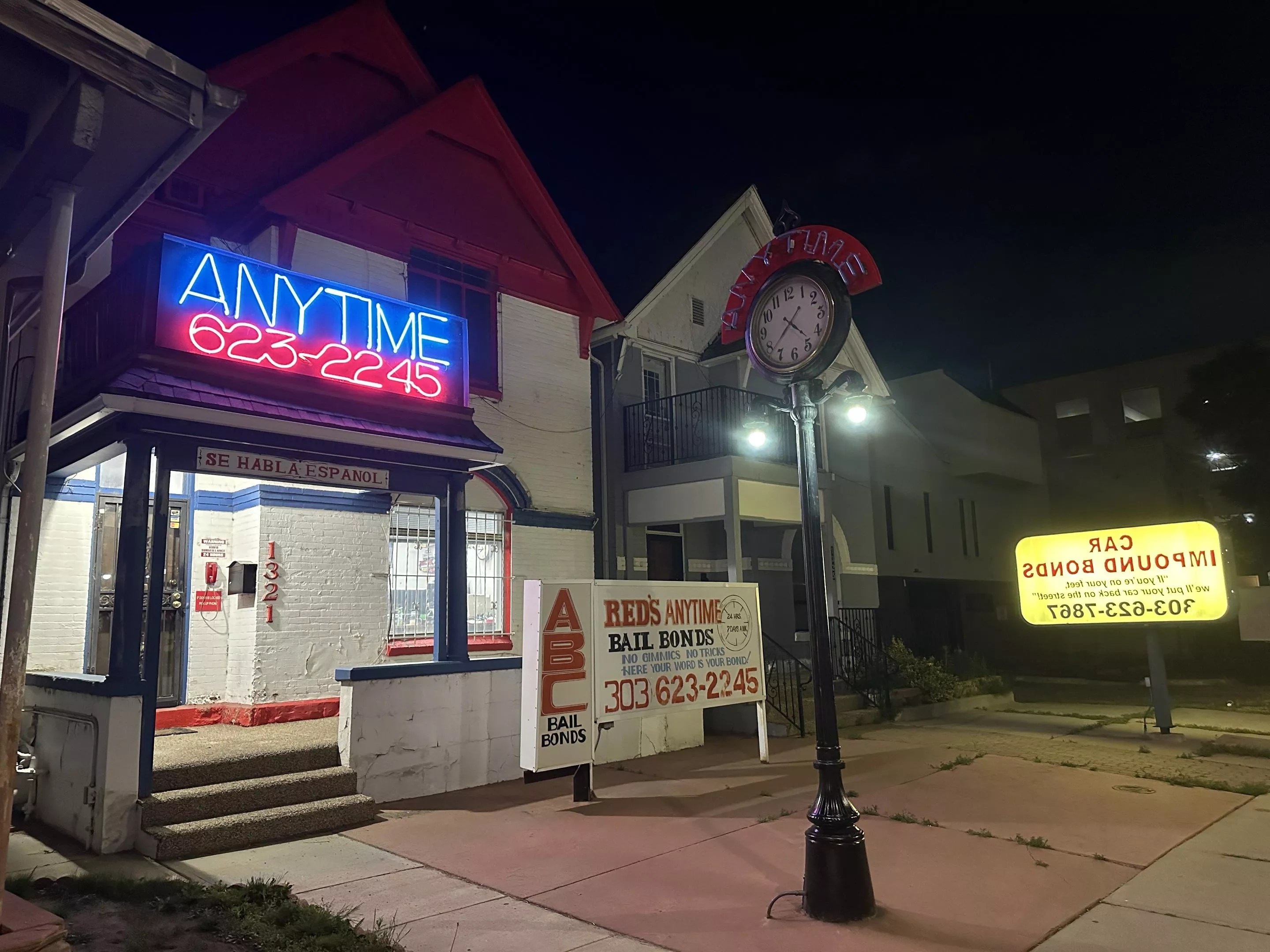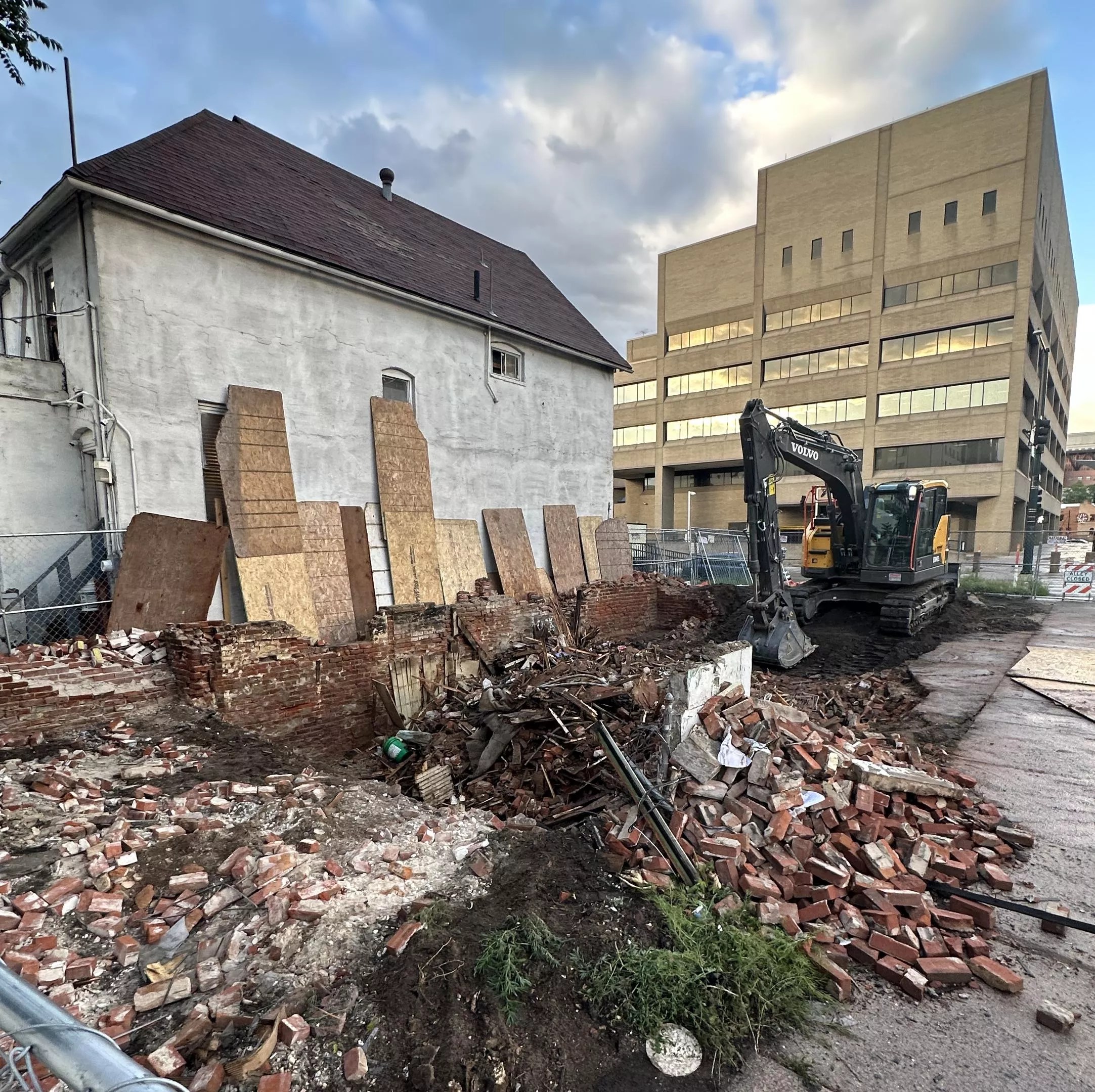
Chris Perez

Audio By Carbonatix
For years, Mark Spensieri, Emily Pacheco and other bail agents positioned around Denver’s Bail Bonds Row – or simply “Bail Row” to some – would sit inside their colorful offices across from the old Denver jail, reeling in “the fish.”
“We’d get up to thirty to fifty people a day,” Pacheco, owner of Reliable 24/7 Bonds, tells Westword.
“I used to sit in my office, and as soon as court got out, one or two $50,000 bonds would just stroll down the street to us,” says Spensieri, owner of Express Bail Bonds at 1304 Elati Street and a former office holder in the now-defunct Bail City on Delaware Street, which is Lucero’s Bail Bonds today. “I would go [write them up] and then go home.”
Things are much different now, according to the longtime bail agents, with Bail Bonds Row becoming a Civic Center ghost town – complete with empty offices, old and abandoned buildings falling into disrepair, drug-using squatters and a dead body.
Just last month, the Denver Police Department coordinated with the owner of one of the decaying properties at 1303 Delaware to have it demolished after repeated calls for service at the house and after first responders reported feeling unsafe. A fire had occurred there a few years back that led to structural damage and the property being unlivable, according to DPD officials, which increased squatting that was already going on there.
“While it was not burned to the ground, the house was left in a pretty bad state of disrepair, with fire damage and smoke damage and things like that making it unable to live in or use,” says Kayla Knabe, community resource officer for the DPD’s District 6.
“Our homeless outreach team was responding to repeated calls for service of trespassing at that location. They would have to go into the building and make sure that nobody was in there and, if somebody was [inside], remove them from the property. So it was just an unsafe situation for first responders to be in there with the state that the building was in.”
Knabe says she contacted the owner of the building – who lives out of state, with a representative in Denver – earlier this year for a conversation about the ongoing issues. The owner told her the home was in the process of being demolished, but it had been delayed for several years due to permitting issues.
“There was some miscommunication between the representative here in the state that was handling the property and the permitting department,” Knabe says. “Once we were able to connect everyone and get communication flowing again, then they were able to be issued that demolition permit and proceed.”
Pacheco, a Denver native with more than three decades of bail agent experience under her belt, used to have her offices inside the 1303 Delaware building before moving out around 2018 to 1309 Delaware, she says. Her old office has been in bad shape ever since, with the COVID-19 pandemic and fire damage making things worse.
“It began attracting bad attention,” Pacheco says. “Homeless and people doing drugs kept going inside, and then it began drifting over to the neighboring properties.”
Right now, Pacheco is the only bail bondsman still actively using offices on Bail Row for in-person appointments and walk-ins. Westword confirmed with the other remaining businesses – Lucero’s and Red’s Anytime Bail Bonds – that the owners are no longer operating in the area and their offices are now in Brighton. A company on the block advertising “Car Impound Bonds” has a number that’s no longer in service. The properties at 1305 and 1307 Delaware are said to be private residences with people living inside, though it’s unclear whether they’re squatters or tenants paying rent.
Dead Body Found
On Monday, June 3, police found a dead body at 1305 Delaware. Officers went to the house around 8:50 a.m. after receiving a call about the deceased individual.
“The case is under investigation,” a DPD spokesperson says.
Two people who claimed to be staying at 1305 Delaware and were at the scene on Monday told Westword the person died of “bad health.”
Pacheco and others describe the home as a “nuisance” property, much like 1303, that is often occupied by drug users and shady characters, which have also led to the demise of Bail Row.
“There’s just always drug users and homeless around,” Pacheco says. “They go to the restroom between the buildings, they post up on our stairs. I used to see five to ten guys at a time going through the front door of [1303 Delaware]. They’d go in and out the back sometimes, too, and hang out around the other buildings.”
A man at 1305 Delaware refused to come out when Westword attempted to make contact on Sunday, June 2, but he did say this through the mail slot: “The owner isn’t here. I don’t know where they’re at. You need to leave.”
According to Denverite, which profiled the area in 2016, the houses on Bail Row were built between 1890 and 1917. It wasn’t until 1977, when DPD headquarters and the old city jail opened on Cherokee Street, that it became the bond oasis that led to its name.
David “Red” Widhalm purchased several of the homes and turned them into offices for what he considered “retail business,” according to Denverite. That’s what prompted the neon signs and bright lights that still exist today, despite the building vacancies.

Most of Bail Row’s lights are still on, even if no one’s home.
Chris Perez
A woman named Juanita Pedotto owned 1303, 1305 and 1309 Delaware for years before eventually selling in the late 2010s, Pacheco says. “They got a new owner, and he kind of just let the buildings go to heck.” she adds. “Once I left and [1303 Delaware] became vacant, there was always homeless around.”
Knabe says safety has been the department’s main concern when getting squatters out of residences and demolishing properties on or near Bail Row. But there has also been a lot of red tape, like post-COVID eviction moratoriums and the permitting issues with Denver Community Planning and Development department inspections.
Something similar happened at 429 West 13th Avenue, a two-story home around the corner from Bail Row that Spensieri owns; it now sits abandoned after being raided by homeless people and drug squatters.
“It’s all locked up now, but we had people in there regularly,” Spensieri says. “Because of stupid COVID, there was an eviction moratorium, and I had trouble getting them out. … Once all that dropped, I did what I had to and wound up getting five people evicted.”
Spensieri had moved off Bail Row in the early 1990s to set up at a nearby office at 1304 Elati Street (next door to 429 West 13th), along with several other bondsmen, including Duane Chapman – also known as Dog the Bounty Hunter.
“This was before the TV show,” he notes.
The office was later taken over by Spensieri and turned into Express Bail Bonds in 2017. “We had a bunch of [bonds] guys in there,” he recalls.
According to Spensieri, Marriott was getting ready to build its Element Denver Downtown East location at 1314 Elati (which opened in 2019), making hefty offers to people in the area to buy their homes, but everyone refused to budge. He made an offer to the man who owned 429 at the time that included a promise of Spensieri never selling out. “The house, 429, was right next door and was owned by a guy who didn’t want to sell it to the hotel,” he says.
“I was going to make it really cute and possibly rent it out or use the space for parking and other things,” he adds. “It was really coming along, and then COVID hit.”

Mark Spensieri (left) poses with Duane Chapman, better known as Dog the Bounty Hunter. The two worked as bail agents on Bail Row in the ’90s.
Mark Spensieri
Spensieri had entrusted a person he knew to fix up the home and look after the property after purchasing it in 2018, but the man “wound up turning into a drunk,” he alleges, “and then began inviting people over and letting people stay at the house.”
After COVID hit, he continues, allegations of the home being turned into an overnight drug den and a haven for the homeless were rampant. A chop shop for bicycles, mopeds and motorcycles was said to have popped up outside the residence at one point.
“Somebody once thought their moped was there, and I gave them permission to go look with the cops,” Spensieri remembers.
Part of the problem, he says, was the installation of a free food pantry outside the home for homeless people after an unhoused individual died nearby. “Their girlfriend asked to open a pantry,” Spensieri says, adding that he and the person watching over the residence obliged. “People would come and eat and then throw stuff down. There would be empty cans of beans, garbage and other stuff.”
The pantry was located in front of the home and off to the side near an alley separating the residence from the Express Bail Bonds building. Marriott had installed a small fence in the middle of the alley with gates at each end to prevent people from parking there, Spensieri says. This ultimately created a place for drug users and homeless residents to hunker down and be hidden from view.
“People would bed down between there,” he says. “The hotel has an easement there, so there was nothing I could do.”
Surveillance cameras and other security measures were put in place over the years to try and deter visitors, but it didn’t work. “I kept having burglaries,” Spensieri says. “If they weren’t breaking in, they were being let in.”
Photos provided to Westword by Spensieri show the effort he had put into it, including the installation of flower beds, updates to the interior and some new fencing around the front set of stairs. But all of it is gone or damaged now.
“It’s heartbreaking for me to go down there,” he says. “I gave [an associate] money to fix things up, and we wanted to turn it into something special. Instead, it’s become a shit show.”
Bleak Future for Bail Agents
Bail agents have a bleak future in Denver, according to Spensieri and Pacheco, who blame legal and societal changes. Neither is sure if they’ll still be around come 2030.
“We have maybe five years left,” Pacheco admits. “I’m here to stay until the wheels fall off, but it’s hard. We see around five to ten people a day, barely. People just don’t use bail bondsmen anymore. They’re either being let out on personal recognizance bonds, getting their own bonds through the jail, getting cash-only bonds or just doing it online.”
Personal recognizance bonds, or PR bonds, are when a judge allows a defendant to be released from custody without money or property put up. The defendant promises to appear at all future court dates and is not tracked down by a bail bondsman if they miss.
“There’s nothing to hold them accountable,” Spensieri says. “That buffer of having to wait in jail, waiting to call a bondsman, paying to get out of jail, being chased down by a bondsman if you don’t show up for court – it’s gone.”
Pacheco and Spensieri both point to changes in Colorado criminal justice laws over the past decade as the biggest culprit of Denver’s dying bail bonds business.

The house at 1303 Delaware Street, previously bail agent offices, was demolished in May after being abandoned for years.
Chris Perez
In 2019, state lawmakers passed a bill to remove monetary bail requirements for certain low-level and nonviolent offenders. This includes people who commit Class 3 misdemeanors, traffic offenses, petty offenses and “comparable” municipal offenses.
At the time, it was estimated that around 13,000 people in jail would be directly affected by the legal change. A 2022 report by Colorado Public Radio outlining the law’s effects noted how violent, high-risk offenders were being given PR bonds in its wake. This included Michael G. Jackson, a convicted felon from Denver who was released from jail on a PR bond after strangling his partner, according to prosecutors. He was arrested just a few weeks later for fatally shooting an Uber driver.
Paying money for a bond doesn’t automatically alter whether a person is likely to commit a crime or not, either. CPR also cited a case in which a Denver defendant decapitated and dismembered a man after being allowed to walk on a $10,000 cash bond. But it helps, Pacheco argues.
“Between the PR bonds, cash-only bonds and bonds being authorized by the jail now, there’s just so many options that don’t involve being held accountable,” she says. “They figure the state will be too busy to come and get them [if they don’t show up for court], so they’d rather go that route now than get a bail bondsman who will. … We’ve lost around 70 percent of our business.”
Another straw that’s broken Bail Row’s back over the years, according to Pacheco and Spensieri, is the fallout from COVID.
“It really knocked us down,” Pacheco says. “They weren’t arresting anybody for two years, basically. Cops didn’t want people in jail, no courts, no walk-ins. I don’t like doing things online. I like to see my clients, see my co-signers. Get a feel for them. And I couldn’t do that. It really messed us up.”
Spensieri says bail bondsmen across Colorado are teaming up to find ways to get their trade out of the gutter and fight legislation that’s hurting them. He’s currently a member of the Colorado Association of Professional Sureties, a nonprofit made up of bail bond industry professionals.
“We’ve been organizing and trying to work on legal issues and other things that could get rid of bail bonds,” Spensieri says. “We want to protect our industry, because we do provide a valuable service.”
He recognizes how things have changed at his 429 West 13th property and on Bail Row, and knows the work that needs to be done by him and others.
“Of course, things can be cleaned up and polished a little bit,” he says. “I do need to make it look better and have more pride in the place. It’s just so expensive to tear down and build something up, and I’ve already done so much already. It needs a good amount of money to freshen it up. So it’s just heartbreaking. It’s really heartbreaking.”